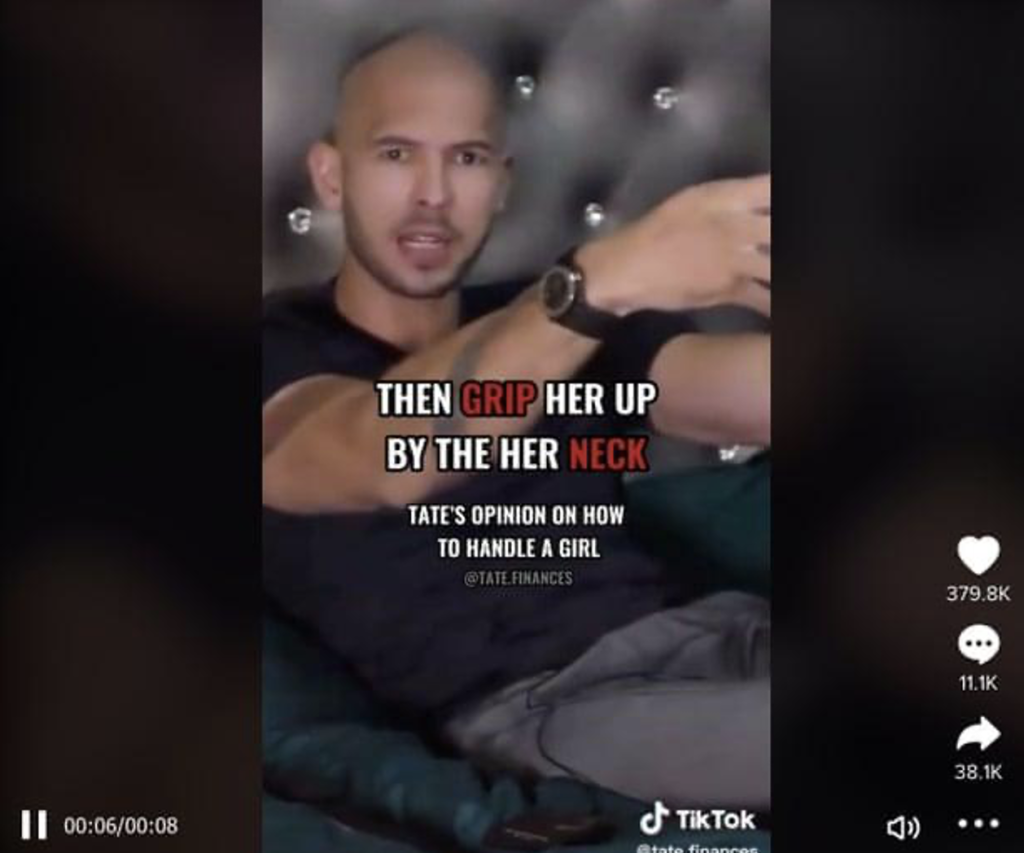Introduction
A report from Common Sense Media found that on average, pre-teens spend about five and a half hours in front of a screen daily, while those between the ages of thirteen to eighteen spend about eight and a half hours online. Most of this time is spent on social media like Instagram, TikTok, and Twitter – not only channels for social communication and media consumption, but also increasingly channels for information discovery. A significant number of these teens are even turning away from traditional verifiable information-gathering sites like Google to rely on TikTok’s powerful algorithm as a search engine.
Whether it’s learning about Russia’s invasion of Ukraine, the dangers of climate change, or what is inside the COVID-19 vaccine, young people are getting crowdsourced information that is often misexplained, misunderstood, and reshared in the digital and physical space, potentially further disseminating harmful untrue claims. This is especially problematic given the research on the long-term impact misinformation has on individual beliefs and critical reasoning even after correction.
Because of digital echo chambers and an overabundance of information, ‘Generation Z,’ the largest generation, is becoming increasingly nihilistic – understanding life to be devoid of meaning, believing all knowledge is subjective, and humanity is inevitably doomed. This is reflected in their humour and other interactions online. This Insight will argue that social media and online misinformation are both contributing to Gen Z’s nihilistic tendencies and priming them to be even more susceptible to extremist rhetoric.
The Echo Chamber Effect
Gen Z is exposed to thousands of unique perspectives about every facet of life, politics, and spirituality each day. Platforms like TikTok, Instagram, and Twitter capitalise on keeping their users engaged by identifying their opinions on subjects by studying their likes, comments, and overall time spent interacting with content. Once users’ interests are identified, apps like TikTok will repeatedly show skewed content that aligns with their beliefs. In doing so, social media algorithms end up validating viewers’ preexisting thoughts, thereby increasing both their screen time and confidence in their viewpoints. If your social media content is a reflection of your own personal opinions, then any inconvenient truths or contrary ideas cease to exist. This phenomenon is known as an echo chamber.
This process warps an individual’s understanding of the world around them by limiting their exposure to a diversity of viewpoints. When moderate beliefs transition to fervent convictions on topics like policy, religion or lifestyle choices, societal and political inaction may cause individuals to become more nihilistic or lose faith in humanity’s progress. This is because the filtered online world that fashions their expectations does not match the one in which they live.
Information Bombardment
It is also clear that there is a large number of youth who are apathetic and care little about issues beyond their daily lives. Yet, this does not mean they are not immune to social media-inflicted nihilism. A 2019 Business Insider poll found that a majority of Gen Z classify themselves as neither conservative nor liberal, largely due to feelings of uncertainty and disillusionment.
Information online often lacks nuance, making it difficult for Gen Z to discern between truth and mis-/disinformation. Rather than put in the effort to verify information online, many respond to this dilemma by disengaging entirely. These individuals feel as if they are living in a post-truth world where any statement can be backed up with ‘evidence’ through a search online. An excess of contradictory information can cause individuals to feel cognitively burdened and ineffective at processing information, negatively impacting their confidence in understanding the world around them.
Regardless of whether individuals are leaning more into their preexisting viewpoints or being bombarded with contradictory information, a significant factor in Gen Z’s widespread adoption of nihilism has to do with their relationship with the internet.
Technology companies are not the only ones playing a part in this rapid adoption of nihilism among younger generations; authoritarian countries that sometimes own parts of these tech giants are playing a part as well. TikTok, which is partially state-owned by China, only allows its younger users to access content related to science experiments, museum exhibits, education and patriotism, with a 40-minute-a-day time limit.
At the same time, the Chinese-backed company does not ship their version of TikTok to consumers in other parts of the world. Many argue this is a recognition of the app’s potential to influence youth development, as they restrict their local app and release the unrestricted, “opiate version” to the West. After Elon Musk’s purchase of Twitter, a Saudi Prince is now Twitter’s second-largest shareholder. It is uncertain if Saudi Arabia will play a role in the redevelopment of Twitter, however, if it takes similar steps as China has with TikTok, it will likely only worsen the crisis discussed above.
Nihilism Among Gen Z
A major multi-country study conducted found that over fifty per cent of young people believe that humanity is doomed, with many of them citing the climate crisis, civil rights abuses, and the inability of governments to govern as reasons. While global institutions are struggling to create solutions to new problems, humans are better off than they have ever been before. Poverty has dramatically decreased, new technologies like the electric car and geoengineering are proving to be promising in mitigating the climate crisis, and democracies around the world are rallying behind Ukraine in the face of the Russian invasion. Echo chambers and information bombardment likely have a role in contributing to nihilistic thought in an increasingly online Gen Z.
The overall acceptance of nihilist thought can be seen in the digital culture of Gen Z and the popularity of memes that relate to feelings of hopelessness, despair, and existentialism. The most notable example of this is the emergence of the popular archetypal character referred to as the ‘doomer.’ This meme is often identified by his dishevelled and sleep-deprived look. This character validates Gen Z’s apathy, self-loathing, and overall discontent towards life. Many young people find familiarity and a sense of comfort in seeing this character in a variety of meme formats as he represents their feelings of dissatisfaction as a result of social media nihilism (Figure 1.0).

Figure 1: ‘The Doomer’ memes
Nihilism as a Gateway to Extremism
The implications of young people becoming increasingly nihilistic are damning. Because nihilists view personal, social, and political issues as inescapable, they regard norms, traditions, values, and actions as obstacles to a productive society.
Nihilists call into question accepted methods or approaches to social change, instead suggesting not just different solutions but entirely different frameworks to tackle modern-day issues. While this logic may seem sound, it could lead to the proliferation and endorsement of conspiratorial ideas, extreme ideologies and controversial figures. Many young people feel disillusioned with mainstream news sources, which are perceived to be maintaining the (broken) status quo. Instead, they may seek out internet personalities who have more extreme ideas. Some of these figures use their platforms to espouse incendiary viewpoints to promote violence against women and minority groups to millions of followers (Figure 2).
Former kickboxer and TikToker Andrew Tate remains popular among young men through reposted videos despite being deplatformed for posting videos degrading women and promoting toxic hyper-masculinity. In his online content, Tate claims that women are “a man’s property,” are responsible for their own sexual assaults, and belong in the home. Recently, Kanye West made hateful comments on live television and online, even going as far as calling for a “DeathCon 3 on Jewish People,” likely a reference to DEFCON, military language for one of the highest perceived threats, thereby signifying Jewish people as foreign combatants. These figures share the belief that societal woes are a product of minority empowerment. Derogatory ideas resonate with young nihilists because, in their minds, mainstream ideologies have failed them. By rejecting socially-accepted norms of equality and recognising the desire for something entirely different, possibly even taboo, internet personalities are pushing the boundaries of accepted thought. Therefore, they are playing a role in producing the next generation of extremists.

Figure 2: A screenshot of an Andrew Tate video
The commentary and content being produced by these influencers and celebrities have already translated into violence. A study of over one million posts in forums found a rise in support for rape, mass killings, and violence against gender minorities. Many of the posters espoused similar ideologies to Andrew Tate, casting blame on women for their failures. A few weeks after Kanye’s many comments toward the Jewish community, the FBI alerted New Jersey synagogues to threats made against them and encouraged safety precautions to be taken.
We are left to wonder whether these online internet personalities are knowingly catering to younger generations who crave content that upends culturally-accepted norms or if they themselves are products of nihilistic viewpoints seeping into Gen Z internet culture. It could also be the case that both of these statements are true. The pernicious forces of nihilism caused by the internet may in fact be creating both the desire for extremist content and the creators of the content themselves.
Nihilism can also lead to violence without the adoption of clear extremist ideologies that come directly from online influencers. Ideological nihilism, or the acceptance of apocalyptic and suicidal thinking, has also resulted in the recent rise of violence across the globe. Rather than just subscribing to a single ideology, these individuals’ overexposure to violent and extreme content causes them to accept niche radical beliefs that transcend the political spectrum. The ideological motives for the Highland Park shooter, the school shooter of Robb Elementary in Uvalde, and even the bomber of the AT&T tower in Nashville remain unknown. Yet, these individuals spent considerable amounts of time online and developed esoteric beliefs that were absorbed from dark corners of social media websites like 4chan.
Conclusion
Social media has created a digital environment that has helped foster a ‘Doomer Generation.’ By creating false expectations of reality online and bombarding young people with content, many have become more nihilistic about the world around them.
Nihilistic online content has been shown to pave the way for the adoption of dangerous ideologies and in some cases contribute toward real-world violence. It is vital that families, school staff, and social media platforms take efforts to both minimise exposure to extremist content online and preempt nihilistic narratives from taking hold in young minds. Parents should be building strong social networks so that youth feel comfortable sharing their hardships, adversities, or the development of a grim outlook on life. Furthermore, families should monitor and have conversations about the online content their children are consuming, putting complex issues discussed online into context.
Whether it’s learning the online language that hints that a student may be more susceptible to extremist narratives or risk factors at home, teachers have an integral role to play in violence prevention and radicalisation. Teachers must learn about red flags that put students at risk of developing dangerous ideologies and be alerted if these risks manifest. Equally, schools should put resources toward counsellors to ensure children have access to social workers who can monitor young students experiencing emotional distress.
Finally, social media companies must take active efforts in building out their content moderation and Trust and Safety teams who can inform companies of radicalisation processes, share knowledge of the extremism spectrum, and identify at-risk users online. Diverting resources toward this department does not necessarily mean censoring content. Instead, social media companies can increase their efforts in adding context to problematic content, aiding the development of responsible algorithms, and creating systems to alert authorities of the planning and coordination of extremist activities.
Daniel Siegel is a 2021 corps member for Teach for America, an Americorps program that seeks to mitigate inequality in the United States K-12 Education System. He is also a counterterrorism researcher at UNC Chapel Hill’s program on digital propaganda. He graduated from UNC in 2021 with a degree in Peace, War, and Defense (PWAD) with an Arabic minor.
Twitter: @the_Siegster
